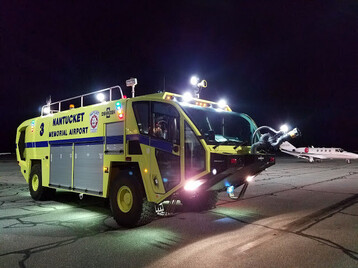Airport Staffing Issues Force Halt To Overnight Fire-Rescue Services
David Creed •

Beginning on April 17th, the Nantucket Memorial Airport will no longer be providing late-night or early-morning aircraft rescue and firefighting, commonly known as ARFF services, to arriving and departing aircraft between the hours of 10 p.m. and 6 a.m. through the summer. The decision was made due to a staffing shortage caused by the airport’s inability to provide employee housing.
“We typically have eight operation specialists and eight maintenance personnel when we are fully staffed, all of whom are trained and certified in aircraft rescue and firefighting,” airport manager Noah Karberg said. “As of the 17th, we will only have six in operations and two in maintenance. We have three relatively new staff who we are taking through that training, but it is a process. They are not part of that eight and while they will be there, it will be a few months before we can get them fully trained.
“We usually offer everything, as Tom Rafter would say, from soup to nuts, 24/7, 365 days a year," Karberg added. "Everything is available right now; it is just a matter of shift coverage. There aren’t enough trained personnel to cover the three shifts per day (in the summer).”
ARFF is a type of firefighting that involves the emergency response, mitigation, evacuation, and rescue of passengers and crew of aircraft involved in aviation accidents and incidents. Per the FAA, airports with scheduled passenger flights are obligated to have firefighters and firefighting apparatus on location ready for duty any time aircraft operate in case of an accident.
Karberg said airport administration is anticipating that this lack of overnight service is going to be in effect until at least September. He added that a combination of issues led to the shortage in ARFF personnel but they all stem from the island’s housing crisis, which has finally reached the airport.
“We have been really fortunate until now to be able to avoid staffing issues that have plagued other town departments,” Karberg said. “The problem we are experiencing is twofold. We have a couple of planned resignations and retirements. We have also had resignations to the private sector and a medical, but we are having trouble backfilling positions that we used to be able to fill. We have interviewed and had great candidates – fresh out of college, excited to come here to the island - but three of them now have been unable to find housing and have declined the job offer as a result and will now go work somewhere else.”
“So there are multiple issues, but it is a housing issue. We are losing people because of housing, and we are losing people because of the lack of available housing.”
Karberg said he and the airport are urging the community to continue supporting the airport’s staff dormitory project, which is currently going through regulatory reviews. The development would be built on land the airport owns off of Nobadeer Farm Road.
Karberg said that the neighbors have been providing constructive and fair feedback and is confident they will be able to come to a solution that leads to the approval of the project, adding that it is a necessity if the airport is to continue accommodating the summer demands.
“We have our housing development and we have been working on it for a few years. It runs into hurdles every now and then, but we overcome them,” Karberg said. “But if the community wants an airport that can meet the demands of Nantucket in the summer, we need their support on our housing project. All we are asking for is we need the ability to spend our own funds on our own projects on our own land.”
About 90 to 95 percent of the airport’s operations take place between 6 a.m. and 10 p.m., so the operations that will now be taking place during the daytime and early part of the evening should be manageable. However, Karberg said where the real impact could be felt is the tasks that were once completed during the night that will need to be done during the day shift.
“Everything we can do at night when it is not busy like fueling aircraft, get ahead on airfield inspection work or relocating aircraft on the airfield, that is helpful,” Karberg said. “So, this does end up putting more burden on the shift during daylight hours.”
Karberg said feedback from airlines and private aircraft operators has been positive and supportive.
“This isn’t the first airport that has post-COVID staffing changes,” Karberg said.